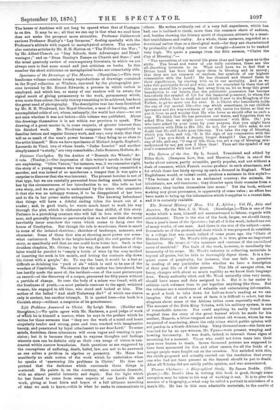The Natural History of Man. Vol. I., Africa ; Vol.
II., Asia and America. By the Rev. J. G. Wood. (Routledge.)—This is one of the works which a man, himself not unaccustomed to labour, regards with astonishment. There is the size of the book, larger, we should fancy, than a year's issue of tho Spectator; but all of it the work, indeed one out of many works, of one man. And there is the size of the subject—man. It reminds us of the professional chair which it was proposed to establish in a college that was much talked of some years ago, the "Chair of Human History." Mr. Wood's title-page, it is true, gives an important limitation. He treats of "the manners and customs of the uncivilized races of mankind." The fault of the work, however, is manifestly the immensity of its scope. Mr. Wood's industry in collecting materials is beyond all praise, but he fails to thoroughly digest them. It is a fre- quent cause of perplexity, for instance, that one fails to perceive in reading of any particular tribe whether we have a description of their past life or of their present. The life of savages often, we fancy, changes with about as much rapidity as we know their language does. Every authority cited, and Mr. Wood naturally cites very many, should have name and date assigned to it. But it is far easier to criticize such volumes than to put together anything like them. But the volumes are a storehouse of valuable and entertaining information, as good a book to take down for half-an-hour's reading as we can imagine. Out of such a mass of facts it is difficult to select, but the chapters about some of the African tribes seem especially well done. The account of the Zulu King Tchaks, with his military system, is one of remarkable interest. Nor could anything be easily found more tragical than the story of the great funeral which he made for his mother, Mnande, a bitter-tongued and violent old woman, whom he was suspected of murdering, about the only crime which public opinion will not pardon in a South-African king. Sixty thousand men—the facts are vouched for by an eye-witness, Mr. Fynn—were present, weeping and howling incessantly. It was death, indeed, to intermit these signs of mourning for a moment. Those who could not force tears into their eyes were beaten to death. Seven thousand persons are supposed to have been massacred for this and other causes, for all the feuds of a savage people were fought out on the occasion. Not satisfied with this, the chiefs proposed and actually carried out the resolution that every one who bad not been present at the funeral should be put to death. After all Tehaka did not satisfy public opinion, and was assassinated.






























 Previous page
Previous page